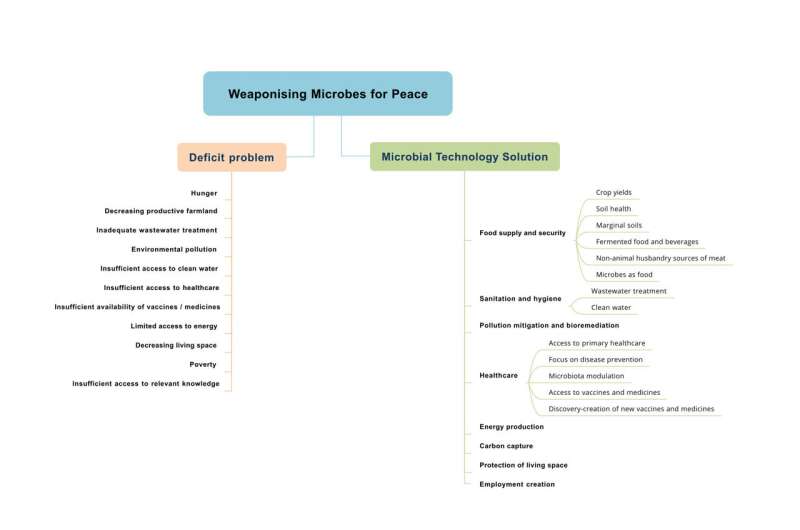Microbes can create a more peaceful world: Scientists issue call to action

Microorganisms should be ‘weaponized’ to stave off conflicts across the globe, according to a team of eminent microbiologists.
The paper ‘Weaponising microbes for peace’ by Anand et al, outlines the ways in which microbes and microbial technologies can be used to tackle global and local challenges that could otherwise lead to conflict, but warns that these resources have been severely underexploited to date.
Professor Kenneth Timmis, Founding Editor of AMI journals Environmental Microbiology, Environmental Microbiology Reports and Microbial Biotechnology, says that worldwide deficits and asymmetries in basic resources and services considered to be human rights, such as drinking water, sanitation, healthy nutrition, access to basic healthcare and a clean environment, can lead to competition between peoples for limited resources, tensions, and in some cases conflicts.
“There is an urgent need to reduce such deficits, to level up, and to assure provision of basic resources for all peoples. This will also remove some of the causes of conflicts. There is a wide range of powerful microbial technologies that can provide or contribute to this provision of such resources and services, but deployment of such technologies is seriously underexploited,” Professor Timmis said.
The paper then lists a series of ways in which microbial technologies can contribute to challenges such as food supply and security, sanitation and hygiene, healthcare, pollution, energy and heating, and mass migrations and overcrowding. For example, microbes are at the core of efforts to tackle pollution by bioremediation, replacing chemical methods of treating drinking water with metalloid conversion systems, and producing biofuels from wastes.
“There is now a desperate need for a determined effort by all relevant actors to widely deploy appropriate microbial technologies to reduce key deficits and asymmetries, particularly among the most vulnerable populations,” Professor Timmis said..
“Not only will this contribute to the improvement of humanitarian conditions and leveling up, and thereby to a reduction in tensions that may lead to conflicts, but also advance progress towards attainment of Sustainable Development Goals,” he said. .
“In this paper, we draw attention to the wide range of powerful microbial technologies that can be deployed for this purpose and how sustainability can be addressed at the same time. We must weaponise microbes for peace.”
The editorial is published in Microbial Biotechnology.
More information:
Shailly Anand et al, Weaponising microbes for peace, Microbial Biotechnology (2023). DOI: 10.1111/1751-7915.14224
Provided by
Applied Microbiology International
Citation:
Microbes can create a more peaceful world: Scientists issue call to action (2023, March 10)
retrieved 10 March 2023
from https://phys.org/news/2023-03-microbes-peaceful-world-scientists-issue.html
This document is subject to copyright. Apart from any fair dealing for the purpose of private study or research, no
part may be reproduced without the written permission. The content is provided for information purposes only.
For all the latest Science News Click Here
For the latest news and updates, follow us on Google News.

